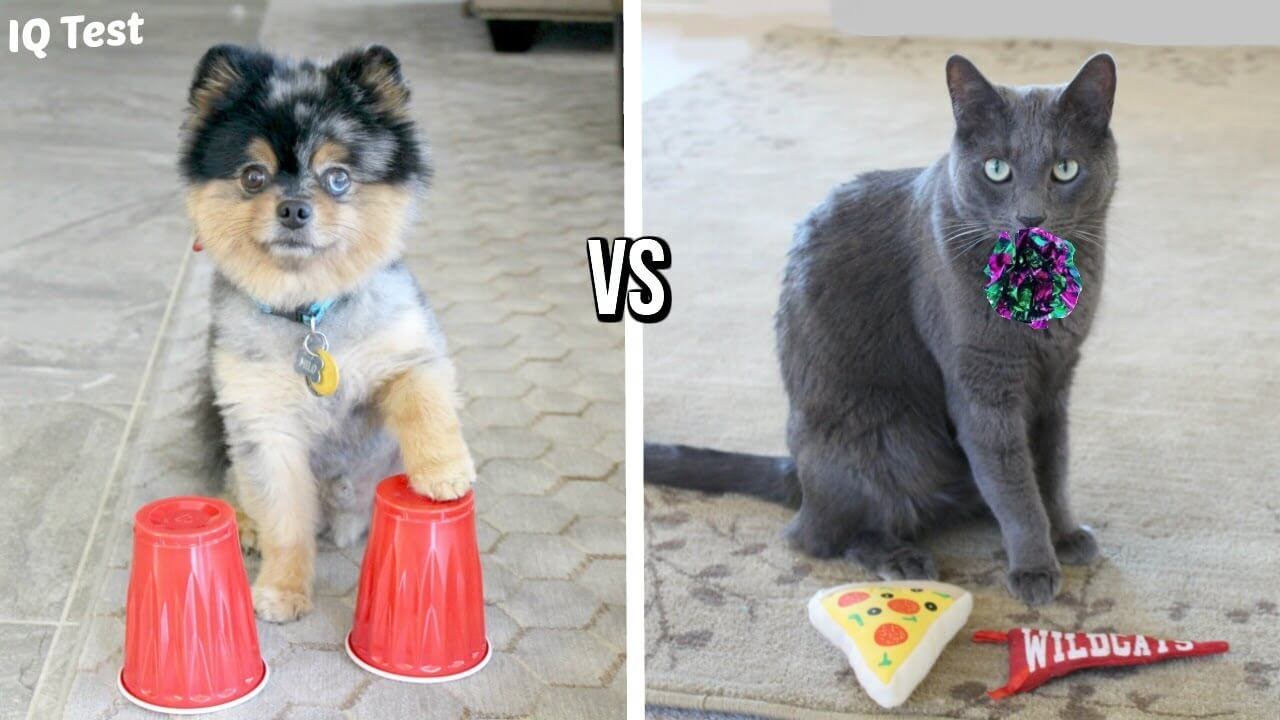Are Cats or Dogs Smarter? A Pet Expert’s Look at Animal Intelligence
From ancient myths to modern memes, the rivalry between cats and dogs has always stirred strong opinions — especially when it comes to the big question: Are cats or dogs smarter? As a trusted source for pet care and canine expertise, dog-breeds.org dives deep into this timeless debate with a fresh, science-backed perspective that goes far beyond stereotypes.
While your Labrador may outshine your tabby in training class, your cat might silently outmaneuver your pup in a clever food heist. So, how do we truly compare intelligence between two species that evolved so differently?
Let’s explore what science, behavior studies, and real-world observations reveal about feline and canine intelligence — and why the answer isn’t as black and white as it may seem.
What Is Animal Intelligence, Really?
When pet parents ask whether dogs or cats are smarter, they’re usually thinking of things like obedience, problem-solving, memory, or emotional bonding. But animal intelligence is multidimensional.
In behavioral science, intelligence refers to an animal’s capacity to:
- Learn from experience
- Solve problems
- Adapt to new situations
- Communicate
- Remember and reason
- Understand others’ intentions or emotions (aka social cognition)
Different animals excel in different domains. Intelligence in one species might be measured by their social adaptability, while in another, it may be about hunting precision or environmental awareness. That’s why a side-by-side IQ comparison between dogs and cats is less like comparing apples to oranges — and more like comparing chess players to escape artists.
Why Dogs Are Often Considered Smarter

Dogs have been companions to humans for over 15,000 years. Through selective breeding, we’ve enhanced their ability to work with people — from herding and guarding to guiding the visually impaired. This history has shaped their unique cognitive profile.
1. Social Intelligence and Trainability
Dogs are pack animals by nature. They’ve evolved to live in social groups, which means reading human gestures, emotions, and facial cues comes naturally. This gives them an edge in:
- Understanding voice commands and body language
- Recognizing human emotions
- Showing empathy or seeking help when in trouble
Studies show that dogs can follow a human’s pointing finger to find food — a skill not easily found in many species, including most cats.
2. Language Comprehension
Many dogs can learn the meaning of hundreds of words. Border Collies, like the famous Chaser, can identify over 1,000 objects by name — a sign of advanced language and memory skills.
3. Brain Size and Neuron Count
While brain size alone isn’t everything, it does tell part of the story. Dogs generally have larger brains than cats, and crucially, more neurons in the cerebral cortex — the area responsible for decision-making and complex thought. One study found:
- Dogs: up to 530 million neurons
- Cats: about 250 million neurons
This neuron advantage may explain dogs’ higher performance in social problem-solving and learning.
🐈 Why Cats Might Be Smarter Than You Think

Cats often get dismissed as aloof or hard to train — but that’s not a sign of low intelligence. In fact, it might be the opposite. Cats evolved as solitary hunters and developed a different kind of smarts: one based on independence, stealth, and spatial memory.
1. Problem-Solving Skills
Cats are skilled solo operators. They open doors, sneak into cupboards, and figure out puzzle feeders — often without external cues. This independence isn’t stubbornness, but a sign of complex problem-solving behavior.
2. Spatial Memory and Navigation
Feline brains excel at mapping space. Their hippocampus (the brain’s memory and navigation center) is highly developed, helping them remember locations of food, litter boxes, and favorite hiding spots — even after weeks of absence.
3. Observational Learning
Cats can learn by watching — a trait known as social learning. In lab tests, cats watched another cat solve a food puzzle and were able to replicate the action. This mimicking ability points to a high level of cognitive processing, even if it’s not often used for tricks.
Cat Brain vs. Dog Brain: How They Compare
Let’s break it down biologically.
| Feature | Dogs | Cats |
|---|---|---|
| Brain Size | Larger overall | Smaller |
| Neurons in Cerebral Cortex | ~530 million | ~250 million |
| Dominant Cognitive Focus | Social communication, cooperation | Vision, stealth, spatial mapping |
| Hippocampus Development | Strong | Highly developed for navigation |
| Trainability | Very high (especially in breeds like Border Collies) | Low to moderate (but possible with positive reinforcement) |
Self-Awareness: The Mirror Test
Neither cats nor dogs typically pass the classic “mirror test” (recognizing themselves in a mirror), which assesses self-awareness in primates and dolphins. However, dogs have passed the olfactory version — showing they can recognize their own scent. Cats, while able to distinguish between their own and others’ waste, haven’t been tested in this way yet.
So, Are Dogs or Cats Smarter?
It depends on what you mean by “smart.”
- Need a loyal partner who thrives on structure and can assist with complex tasks? Dogs win.
- Prefer an independent companion who navigates the world on their own terms? Cats may surprise you.
The intelligence we see in pets often reflects their evolutionary role. Dogs evolved to cooperate and communicate, while cats evolved to observe, stalk, and survive solo. Each set of skills represents a different type of cognitive strength.
Real-Life Intelligence: Who Adapts Better to Humans?
In a home setting, dogs often appear more intelligent because their behaviors are easier to interpret, and they actively seek human interaction. Cats may not show off their smarts unless it’s on their terms — but that doesn’t mean they’re lacking.
Fun fact: When left to fend for themselves, cats are generally better survivors than most domestic dogs. Their hunting instincts, agility, and stealth give them an edge in the wild.
dog-breeds.org is your trusted companion in understanding the minds of your favorite pets — from Golden Retrievers to curious housecats.
FAQ: Common Questions About Pet Intelligence
Q: Which species is more emotionally intelligent?
A: Dogs show higher emotional responsiveness, especially to human emotions. However, cats can form deep bonds and recognize their owner’s voice, even if they don’t always respond.
Q: Can cats be trained like dogs?
A: Yes, but it requires patience and motivation (typically food). Clicker training can work wonders with cats when done right.
Q: Do smarter pets need more stimulation?
A: Absolutely. Intelligent dogs and cats benefit from enrichment like puzzles, interactive toys, and playtime to prevent boredom and stress.
Q: Are some breeds of dogs smarter than others?
A: Yes. Breeds like Border Collies, Poodles, and German Shepherds are known for their high trainability and mental agility.
Q: Do cats remember people?
A: Cats have excellent long-term memory and can remember people, places, and routines — especially if positive or negative experiences are involved.
Final Verdict: Intelligence in Different Forms
The truth is: dogs and cats are both intelligent — just in different ways. Their brains are wired for the lives they were born to lead. Dogs may win in trainability and social cognition. Cats excel in autonomy, stealth, and adaptability.
So instead of asking who’s smarter, maybe the better question is: Which pet is smarter for your lifestyle?
And whatever you choose, you can count on dog-breeds.org for expert-backed, pet-first advice — helping you understand, bond with, and care for your furry friend in the best way possible.
- Standard Poodle Dog Breed: The Elegant Athlete of the Canine World - July 28, 2025
- Golden Retriever: The Ultimate Guide to a Beloved Canine Companion - July 22, 2025
- How Big Can Maine Coon Cats Get? - July 22, 2025



